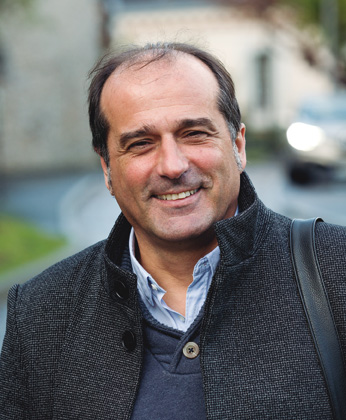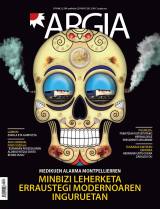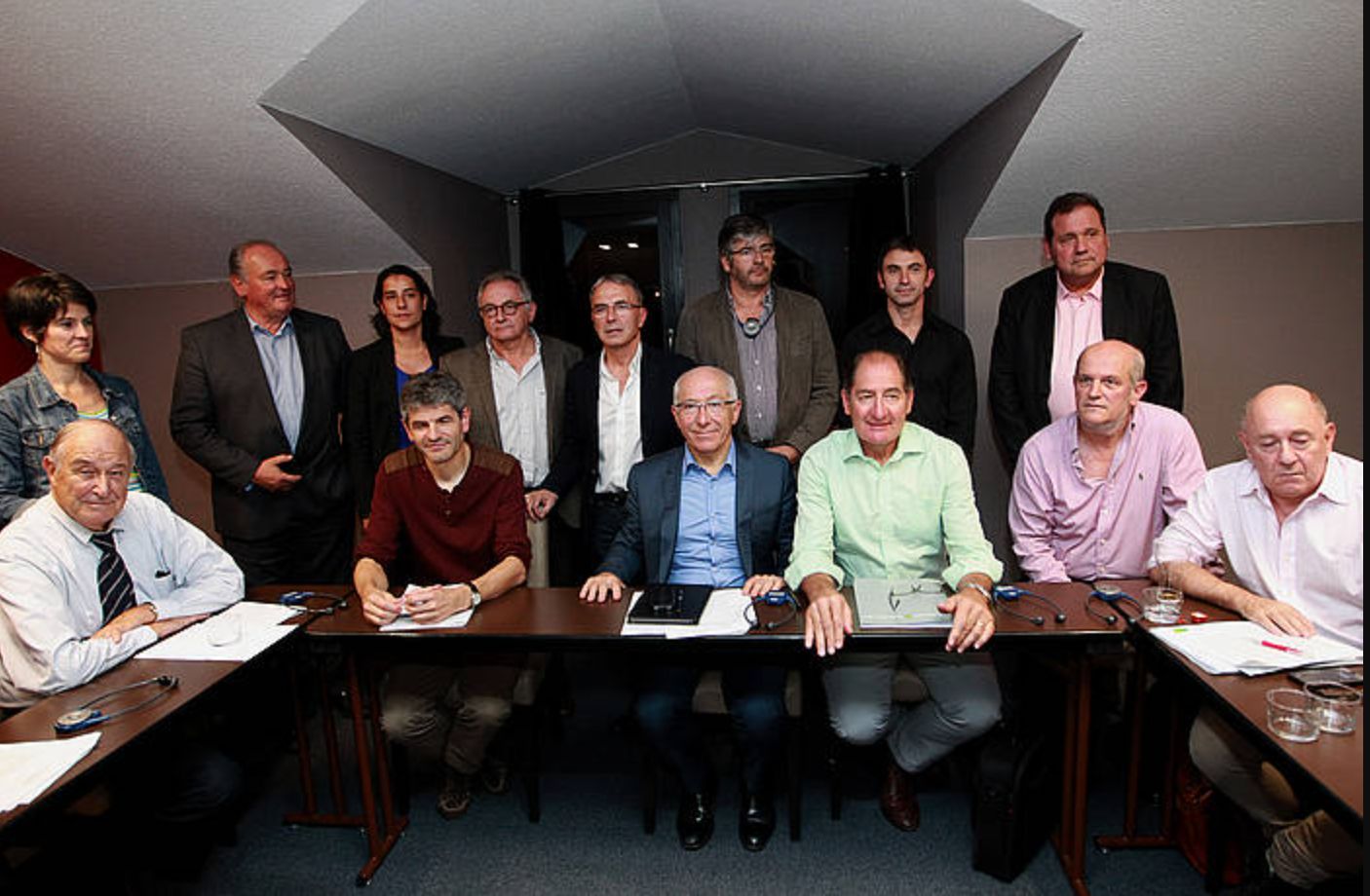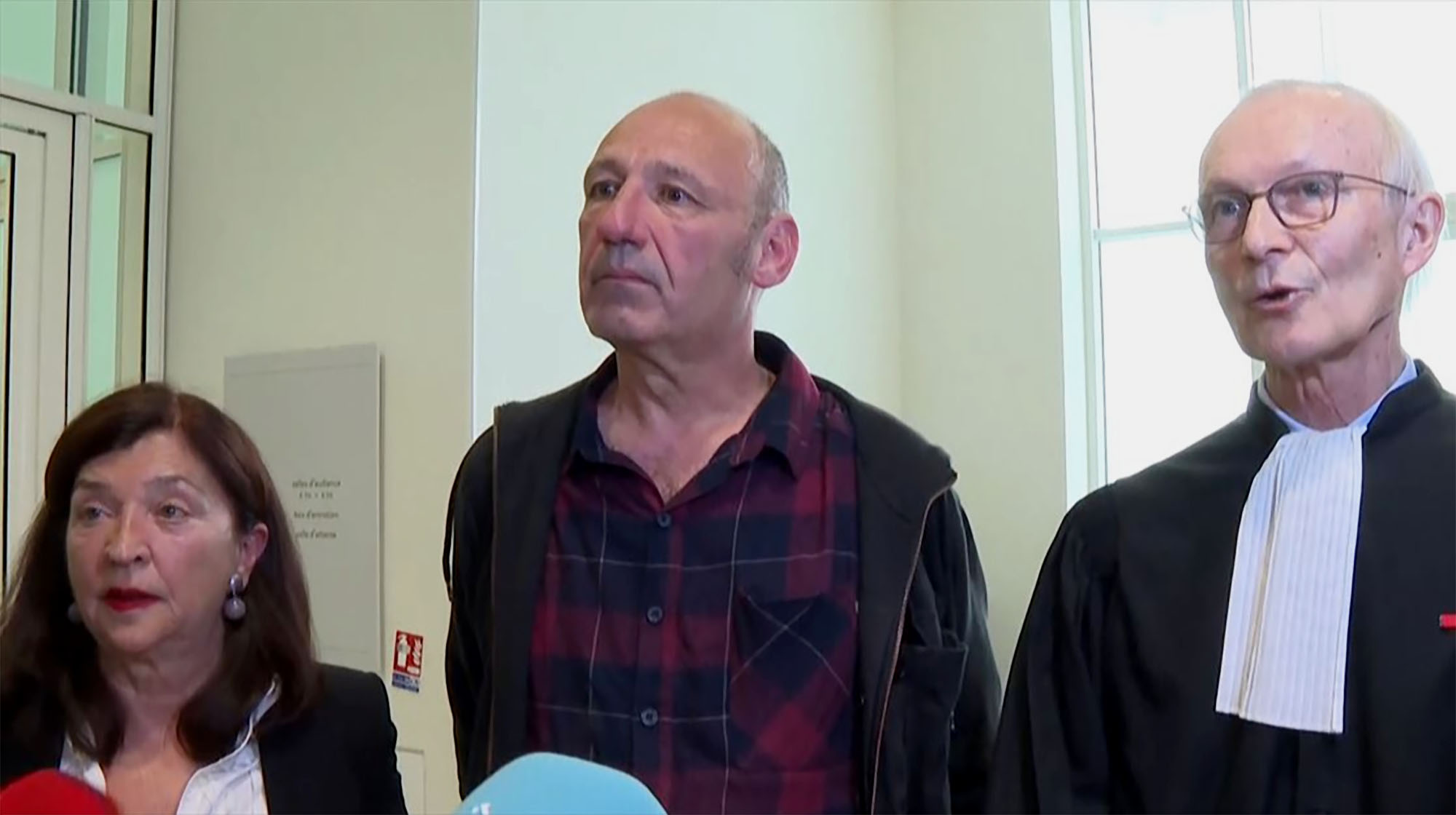"The process is complicated, but positive work is being done"
- Irun, 1962. He's the president of Hendaia's Antxeta radio station. Coordinator and Spokesperson of the Permanent Social Forum. On 26 and 27 January, a special forum will be held in Ficoba de Irun to analyse the situation of refugees and deportees. We met after some 100,000 people demonstrated in Bilbao in defence of the rights of Basque prisoners. We have also talked about the peace process and political standardisation, as well as the latest developments that have come from France and Spain.

The French Ministry of Justice has recently announced that it will take steps forward on the subject of Basque prisoners.
We believe that the process should be taken without anxiety. The peacemakers have been working on this for a long time, that is to say on the 59 cases of eta prisoners. After analyzing the situation of each of them, the news has come that several prisoners will be transferred to prisons near the Basque Country. The Ministry publicly announced that the matter was being analysed by both sides, confirming that it is a process of bilaterality. “We should not expect spectacular results,” says the Social Forum, that the process should be seen as a source. The source is open, in Iparralde a few drops start to fall, and the process will spread and run. The State representing the Ministry of Justice has contacts with the Spanish Government, so the process is complicated, but positive work is being done.
Drop by drop, but the process goes on.
In the French State there have been recent years, when the winemakers have been clear. For example, last spring a prisoner was transferred to the Baiona Hospital for release. Mikel Irastorza, a member of ETA’s management, lives in Baiona...
Is this public?
Irastorza was arrested in Azkaine and was recognised by the governments of France and Spain as one of the last ETA executives in the state. But, beyond the category they have given him, for us the most important has been the attitude of the judge: After ETA’s disarmament, we are on another stage. For the first time, it is significant that a person charged with such a charge is on the street pending trial. Another element has been the withdrawal of the status of DPS (Detainee Prisoner) from seven prisoners of eta imprisoned in Barcelona. According to all logic, after the step taken on 8 April [ETA's disarmament], the French Government has moved from being passivity to taking steps. In this sense, we understand the process.
Is it considered a bilateral process?
The peace and normalization process of Euskal Herria is not bilateral, it is evident. ETA took its own decision, but the disarmament process has taken place within the parameters of the United Nations (UN) integrated standards, also in this process disarmament has been within the definitions of international processes. There are ten parameters that have been met in full and transparently, with the approval of the French Government, in the eyes of the international community. That has given civil society confidence.
In any case, bilaterality...
...I would say that there is a process of bilaterality between the pacifists of Iparralde, the electorate and the Ministry of France, that the process is being carried out through civil society, the institutions (being the President of the Commonwealth, Jean-René Etchegaray) and the EPPK, of course, I would not say that they are in the process of negotiation. The word negotiation brings us to the times of Switzerland, Norway or Algeria, and we are not in it. We are, however, in a process of resolution.
What is the process going on in the South?
We are building a multilateral process. The Basque Government, the Government of Navarra and the parties – PNV, EH Bildu, Elkarrekin Podemos and PSE-USA – are ready to contribute to the process, as well as to the unions. A high degree of consensus is being achieved.
The Secretary General for Peace and Coexistence of the Basque Government, Jonan Fernández, questioned what the road could be between the pacifists of Iparralde and the Ministry of Justice of Paris. Now, however, he has considered "positive" the step taken by the formation of Confesbask.
We do not value the statements of other agents. However, I must acknowledge that these statements by Fernandez caused astonishment to some of the Social Forum’s agents. I would like to highlight one main element: In the system of the French Republic it is very important – we are seeing it in Corsica – that the Ministry of Justice should have discussions with the elected ones. Etchegaray is the representative of the Republic, the leader of the pacifists. Peacemakers are not only members of civil society, but also associations and elected officials. The delegation of Iparralde is headed by the president of one of the three administrations or territories of the Basque Country.
Therefore, the motto is “It cannot be done with effort”.
To the various actors we are working on at the Social Forum, I first heard: “That’s depreciated.” Now, as in disarmament, we are reaching the first partial agreements for a comprehensive agreement on prisoners, so we are seeing that the socio-political situation is not depreciated. There is nothing more to do with how society took disarmament. In Euskal Herria no one doubts that ETA has been disarmed. Subsequently, the media have paid great attention to our tasks. We hope that with the demobilization of ETA a similar step will be taken to move forward on the issue of victims, prisoners, deportees and escapes.
Before the end of the political course they hope to “demobilize” ETA. It was the concept itself that gave much to talk about.
Yes, but demobilization is a concept created by the UN for the resolution of violent conflicts, three main concepts: disarmament, demobilization and reintegration. Disarmament has taken place in these parameters. We do not know what word ETA is going to use to make its decision public. We do not know in what words the governments, political parties or trade unions of the Basque Country will qualify this decision. For us, the most important are these two elements: First: Let what ETA says be clear and consistent. The second is that in this decision there are three characteristics to foster coexistence: critical, shared and constructive reading.
On 8 January you met Olarra Guridi, a member of ETA, in the Granada prison of Albolote. In what context?
We have asked for a meeting with the EPPK partners in the two states. Given the lack of response, seeing that the process continues, even though the conditions are not good, we decided to carry it out “in the form of a visit”. The visit lasted 40 minutes, but not in good condition, we talked about glass. We worked on three points and made them known. Then each media has emphasised the points in different ways. First point: We have explained to the EPPK the work we carry with parties and unions, in a multilateral dialogue. This point aims to develop a cross-cutting roadmap between all actors involved and the EPPK. The construction of a roadmap is a necessary requirement, as it will facilitate in the future the issue of coexistence and how to solve the problem of prisoners.
Prisoners of eta have already begun to take steps within prison legislation. Is there cohesion between them?
I do not know what each prisoner has voted for, nor what his position is in the dynamics of the EPPK. Surely, today there are 300 prisoners and there are 300 opinions. I value it positively. As Olarra Guridi told us, the cohesion indicator is the number of votes. There are people who voted in favour, against, against, in abstention or against. They are all members of the EPPK, although some have voted against and all have joined the proposal.
What was the second point of the meeting?
Prisoners have shown their full readiness to contribute to the process, as well as to listen to the contributions of the other agents. Inmates are analyzing the difficulties on the way and are "making decisions". The processes inside the prison are long. Prisoners are asking for their fate, most of them have taken the step of moving to second grade, but they are receiving the 'no'. 96% of the collective is in the first grade of the Basque Autonomous Community. In the case of being in the 2nd grade, they may apply for authorisation of the permits.
What was the third point?
Recognition of pain caused. The right to truth, reparation and justice of the victims. EPPK says: “We are ready to initiate a process of constructive dialogue with the victims in the objective of coexistence, if we build an appropriate framework that has not existed until now, ‘a framework without reproach’”.
In any case, the time is positive.
“We have to seize the opportunities, I don’t know what this new process will be called, but it will be ‘own’, it will respond to the political situation we live in 2018”
We believe that we are at an interesting moment in the process. What the EPPK said is valuable, but in order to reach the right framework, prisoners have to move to 2nd grade. However, today’s system does not allow it, Grade 1 does not allow for progress, prisoners have already reached the neck of the bottle. Each of the inmates has made their own request for jail and the answer has been the standard. All of them have been told: “He is rejected for belonging to an undissolved terrorist organization.” This is the same argument for all, they are not taken into account in the prison route, their attitude, their work ... That is what needs to be done in order for the framework for dialogue to materialise. The EPPK is ready and all agents have been shown to be favorable.
Do all political parties have the same attitude?
Each of them has its own nuances, but all the Basque parties are in favour of the process developing. As an example, Rafaela Romero of the PSE-EE has stated that “for years prisoners have been asked to open this path and when they have started they do not leave them.” Meaningful, right?
The ppp's advance is missing.
The Spanish Government and pp need to take decisions. Alfonso Alonso has pointed out in the media that, after the dissolution of ETA, which did not use the word demobilization, the prison policy will change. Zoido said that "we will apply ordinary legality to prisoners". That is what we are asking for, to replace the policy of exception that applies to Basque political prisoners with ordinary legality.
Understanding between the Social Forum and the EPPK is critical to moving forward.
In this process it has been very important to work on relations with the EPPK, to provide input and to give prisoners a clear idea of what parties and trade unions are saying. One of our tasks is that all parties, trade unions and political actors are prepared to work with the EPPK. In short, a cross-cutting agreement between governments, parties and trade unions to carry out a decisive process around prisoners.
Is there a difference between this road and that of Nanclares?
The Social Forum has always respected the decisions taken by all prisoners, both those of the past and those of the present. Today we are in a new context, the Nanclares Road probably responded to a concrete social political context, and today we are in another. We have to seize the opportunities, I don’t know what this new process will be called, but it will be “own”, it will respond to the political situation we live in 2018.
What are the interim steps?
It's three. First: to achieve a comprehensive agreement between all political parties and trade unions in Hego Euskal Herria. Second: mobilisation of civil society and third: Create a stream of opinion in the Spanish State that will help in this direction. All three of us are getting stuck.
























